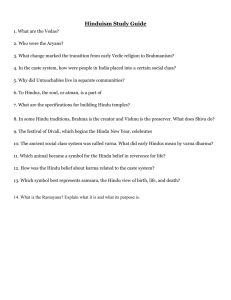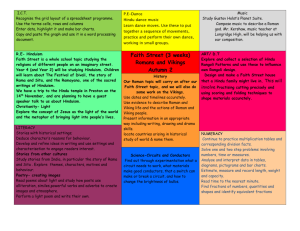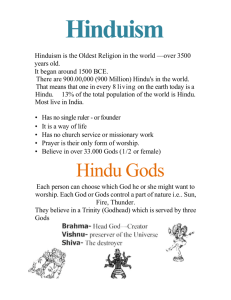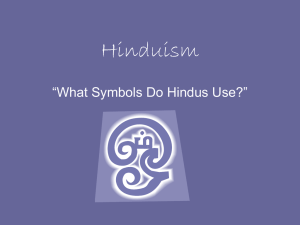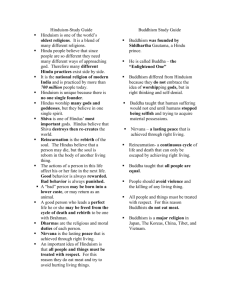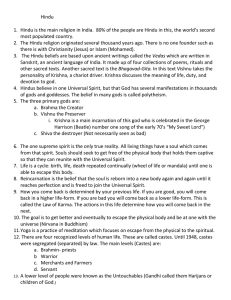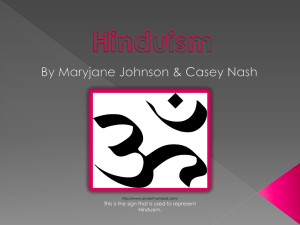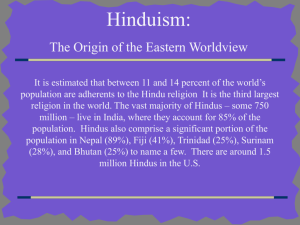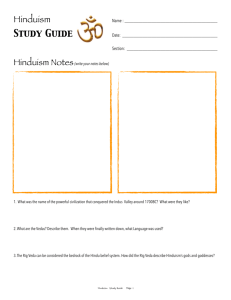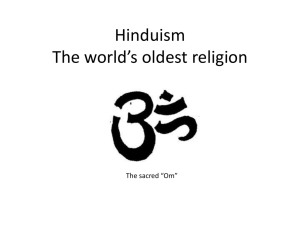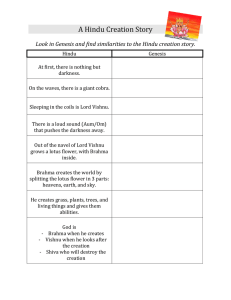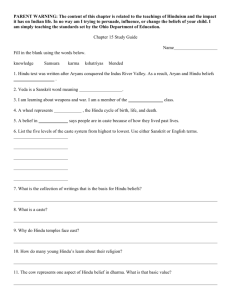Grade 11 World Religions
advertisement
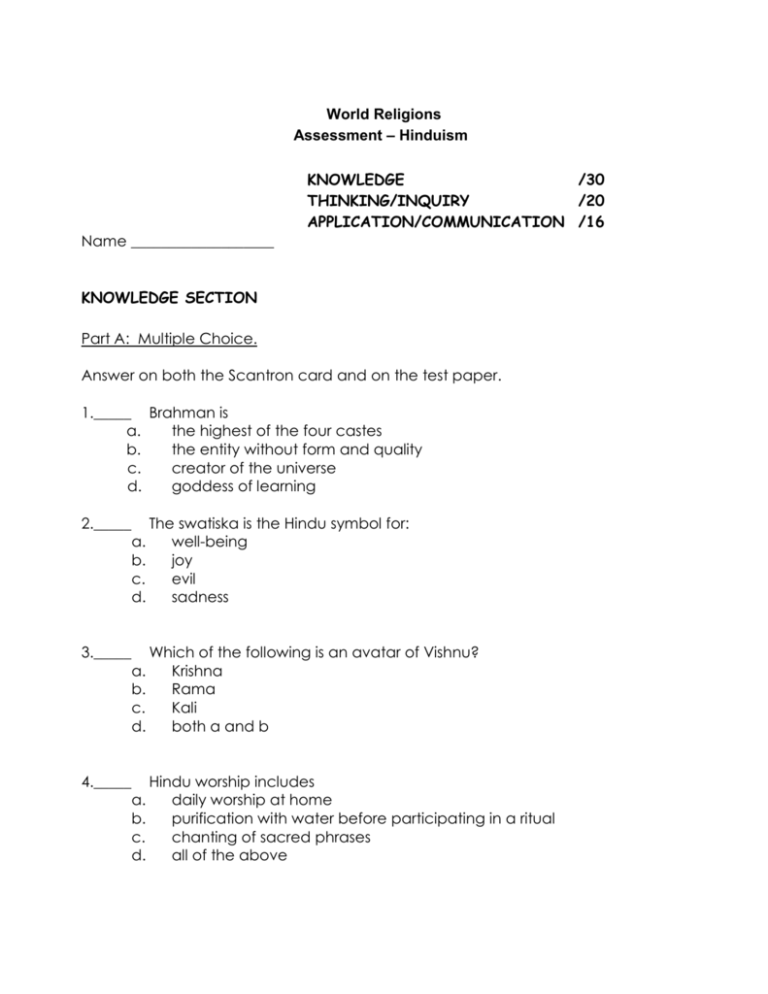
World Religions Assessment – Hinduism KNOWLEDGE /30 THINKING/INQUIRY /20 APPLICATION/COMMUNICATION /16 Name ___________________ KNOWLEDGE SECTION Part A: Multiple Choice. Answer on both the Scantron card and on the test paper. 1._____ Brahman is a. the highest of the four castes b. the entity without form and quality c. creator of the universe d. goddess of learning 2._____ The swatiska is the Hindu symbol for: a. well-being b. joy c. evil d. sadness 3._____ a. b. c. d. 4._____ Which of the following is an avatar of Vishnu? Krishna Rama Kali both a and b Hindu worship includes a. daily worship at home b. purification with water before participating in a ritual c. chanting of sacred phrases d. all of the above 5._____ This Hindu god is known as the destroyer and restorer of the universe: a. Brahma c. Shiva b. Vishnu d. Rama 6.___ a. b. c. d. The Hindu god who “drank” from the milk offered to it was: Saraswati Parvati Ganesha Lakshmi Part B: True or False. Answer A= true and B= false on both the test paper and on the Scantron card. 7._____ Hindus believe a person dies only once before moksha is achieved. 8._____ Divorce is not encouraged but is allowed in today’s Hindu world. 9._____ The Aryans were the first people to live in what is now India. 10._____ Hindu weddings are simple ceremonies, lasting about 10 minutes. 11._____ The four Upanishads are the oldest and most authoritative scripture. 12._____ Hindus consider the Ganges River sacred enough to cleanse all sins. 13._____ Varanasi is a Hindu scripture. Part C: Identification Listed below are Hindu paths of salvation. Match the appropriate letter to the numbered examples or descriptions of the paths. Answer on both the Scantron card and on the test paper. Answers may be used more than once. a. b. c. d. Path of Action Path of Meditation Path of Wisdom Path of Devotion 14._____ Calls for the guidance of a guru. 15._____ Salvation is achieved through deep contemplation on Brahman. 16._____ A popular path providing worship in a concrete way. 17._____ Good deeds are unselfish and are done because they are morally right. 18._____ Involves singing praises to the deity. Part D: Matching Match each definition below with the word that fits the definition. Write the letter in the blank before the definition it matches. NOT ALL TERMS WILL BE USED. a. samsara b. Agni c. ahimsa d. mantra e. Bhagavad-Gita f. homa g. Mahabharata h. Maya i. Puja j. Ramayan k. Shakti l. Shruti m. Smriti n. Swami o. yogi 1._____ human-made literature. 2._____ God of fire 3._____ Knowledge that is revealed. 4._____ Spiritually evolved individual who practices meditation. 5._____ Doctrine of non-violence 6._____ Holy men of Hinduism. 7._____ Hinduism's “bible” 8._____ Hindu epic poem that tells the struggle between two forces. 9._____ Ritual that involves the burning of offerings in a fire. 10._____ Refers to the temporary and imperfect nature of the physical world. 11._____ sacred word or phrase that is chanted during worship or mediation. 12._____ Endless cycle of rebirths THINKING/INQUIRY QUESTIONS Answer in complete sentences in the space provided. 1. Describe the differences between Sihkism , Hinduism, and Jainism. (4 pts) 2. Describe two patterns in Hinduism. (4 pts) 3. Describe the Hindu caste system. Build a case arguing why it is fair or unfair. (6 pts) 4. Describe in detail three Hindu holidays and explain their significance.(6 pts) APPLICATION / COMMUNICATION QUESTIONS: (16) 1. Respond to the following in well-organized paragraphs: (8 Marks) “Some religious scholars argue that Hinduism is not a religion, but merely a collections of religious beliefs of people who live in India.” 2. Gandhi is said to practice Satyagraha – a religious technique that can be interpreted as “insistence on truth and non-violent acceptance of the consequences.” In well-developed paragraphs, comment on Gandhi’s practices with specific references to scenes in the movie viewed in class. (8 marks)
